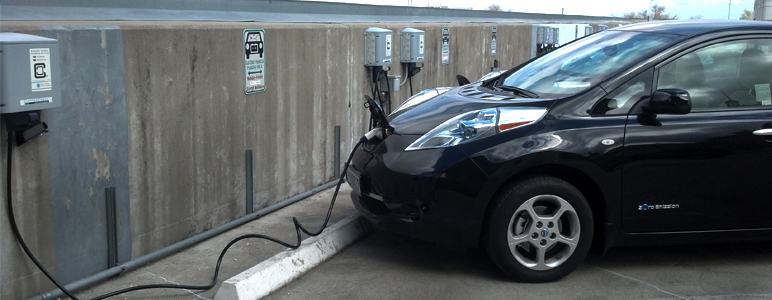


Employers who incorporate electric vehicle (EV) charging into their sustainability planning will not only provide a valuable benefit to employees, they can help boost workplace pride and accelerate the market growth of EVs.
“When you walk by an electric vehicle charger every day, you see a commitment to the technology and you begin to consider an EV as a viable option,” stated Sean Anderson, vice president for Corporate Real Estate and Facilities Management at MassMutual in Springfield, Mass.
At various locations, MassMutual has 64 electric vehicle charging stations and 400 more parking spaces wired so they are EV-ready.
Anderson continued, “Even if our employees don’t have an EV, they are proud of their workplace because they know we support lowering greenhouse gas emissions.”
Increasingly, plug-in charging infrastructure is escalating the demand for electric vehicles. As charging stations are planned across a region or state, vehicle manufacturers are taking note – even working with regional planners to encourage more charging stations – and then deploying more vehicles to that area. And, as EV choices expand, more consumers choose to purchase them. Then EV charging stations are in even greater demand, and the cycle continues.
Andy Hoskinson, senior project manager of EV Initiatives at the Center for Sustainable Energy (CSE) explained, “Consumers have historically thought that electric vehicles just weren’t for them, but with the introduction of a variety of vehicle types, including long-range vehicles at lower price points, we are seeing less of that thinking.”
Importance of workplace charging
Workplace charging is among the most important factors in a consumer’s choice to drive an electric vehicle, Hoskinson said. Research conducted by CSE for California’s Clean Vehicle Rebate Project shows 65 percent of new EV owners surveyed said workplace charging was important in their purchase decision, with 37 percent saying it was very or extremely important. Further, CSE’s consumer survey of participants in the Massachusetts Offers Rebates for Electric Vehicles program shows that 75 percent of them have workplace charging or would use it if it was available and 27 percent said that access to workplace charging was an extremely or very important factor in making it possible for them to acquire an EV.
Anderson agrees. He’s found having EV charging helps make MassMutual an employer of choice. During interviews, many potential employees ask whether charging is available, and upon hire, some state that the reason they chose to work at MassMutual was because of its commitment to sustainability and the availability of workplace charging.
“What Sean is saying is powerful,” Hoskinson observed. “It’s a testimonial to what we see in the data. The importance of workplace charging in a consumer’s choice to buy an EV is a top priority.”
NESEA panel presentation March 8
I had the opportunity to talk with Anderson, Hoskinson and Stephen Russell, an alternative transportation program coordinator for the Massachusetts Department of Energy Resources, as we prepared for a panel presentation on the topic of “Buildings in the Age of Electric Vehicles.” It will be held at the BuildingEnergy Boston 2017 conference sponsored by the Northeast Sustainable Energy Association (NESEA) at the Seaport World Trade Center on March 8. The speakers are excited about the interplay between increasing numbers of charging stations, vehicle options and availability and the role of building developers and owners in the market transformation for EVs.

